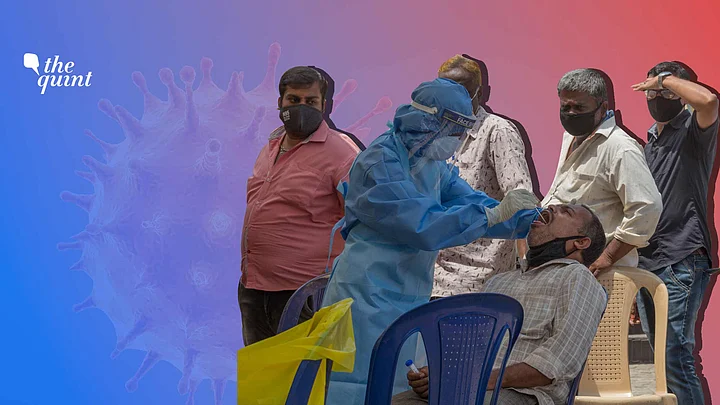Mumbai-based Vipul Yadav, a 37-year-old senior brand manager in an FMCG, who was trying to book an RT-PCR test for his father, could not do so for a long time. He tried to find a slot on Metropolis Diagnostic Centre, Dr Lal Path Labs, and Suburban Diagnostics Centre – but to no avail.
I had gotten tested to travel for work twice before, once in October 2021, and then again in December. However, when I tried to book slots for my father on 5 January, I could not. I still have not gotten a call back from two of the labs. One of them had a slot three days later. We eventually got a test booked via an acquaintance.Vipin Yadav
“Whenever there is a sharp rise in the number of cases, there is immense pressure on those testing you as well. I have heard from my friends in the medical field that it is quite excruciating on the ground,” the 37-year-old adds.
As the daily COVID-19 cases in India cross 1.5 lakh – and with more and more people wanting to get tested – there is an increased burden on the testing capacity.
In Mumbai, over 68,000 tests were conducted on 8 January, Saturday, and around 59,000 on 9 January, Sunday. It has been observed that fewer test are conducted on public holidays and Sundays. Meanwhile, Delhi tested over 96,000 on Saturday and 76,000 people on Sunday.
Delhi-based Kanchan booked a test via Thyrocare and got a home collection done early morning on 7 January. However, her test results were delayed.
“I kept waiting for the results and delaying my doctor's appointment. Eventually, I ordered a rapid antigen test (RAT) kit from the pharmacy nearby and got tested,” she adds.
The RAT yielded a positive result. She eventually got her RT-PCR test result almost three days later, by when she had a 101 fever and weakness.
'Cases Went From Zero to Hundred Too Soon'
Dr Arjun Dang, CEO, Dr Dangs Lab tells The Quint that the number of tests in the last few days have been nearly as high as the number of tests being conducted during the second wave. He further adds that since there is an overlap with peak winter season, symptoms can be seen all around, and the anxieties are higher.
Speaking about the speed at which the variant has spread, he says that it was ‘too sudden’ and that it went from ‘zero to hundred’ in a flash.
We had taken abundant steps and were well prepared. However, this time, the graph is too vertical.Dr Arjun Dang, CEO, Dr Dangs Lab
But, although labs are under pressure, there's some respite as compared to the second wave.
He says that the demand for RT-PCR is slightly lower because of how easily available RAT kits are.
Moreover, in a fresh set of guidelines, the Indian Council of Medical Research (ICMR) has said that those who come in contact of COVID-19 patients need not get tested unless identified as high-risk, based on co-morbidities or age. This could take some pressure off the testing labs.
The guidelines broadly state:
Those who have symptoms can get tested
At-risk contacts of laboratory-confirmed cases should get tested. At-risk are those who are over 60 and have co-morbidities like diabetes, hypertension, chronic lung or kidney disease, malignancy and obesity
Asymptomatic individuals need not get tested
Contacts of those who have tested positive and are not under the high-risk category, need not be tested
Those discharged as per home isolation guidelines need not be tested
‘Test Smart Rather Than Test All'
In a vaccinated population, your testing policy has to evolve from 'test, test, test,' say experts.
Public health and policy expert Dr Chandrakant Lahariya says that testing strategy should be "to test smart rather than test all".
"We must remember the purpose of testing at different stages. In the first wave, the purpose was to identify and isolate in order to reduce transmission. Currently, testing does not change the course of the management."Dr Chandrkant Lahariya
He adds that since many are asymptomatic and the transmission is more wide, "we must optimally use our resources". One way to reduce that burden is by testing those who have symptoms.
Yet, he says that all those who want to get tested, should be able to do so. At the same time, the target should be testing unvaccinated persons and those who are at a higher risk.
He further adds that testing through RAT is a good alternative as it is quicker and helps save time. In the UK for example, you can ask the government to send RAT kits home for self diagnosis.
"The sensitivity of such tests is 50 percent. If the person is positive, they need not get an RT-PCR test. However, if they have symptoms and have tested negative, they could go ahead for an RT-PCR test," Dr Lahariya explains.
However, most testing labs stop testing when they have reached their capacity. Dr Arjun Dang says, “If we take more samples than we can, the test reports get delayed and this defeats the purpose. It is very important for labs to calibrate capacity with turnout time.”
He adds that a lot of customers who test positive ask about their variant.
“It is more important to get tested and treated, rather than finding out which variant it is, since the treatment is not as dependent on the variant,” he says.
